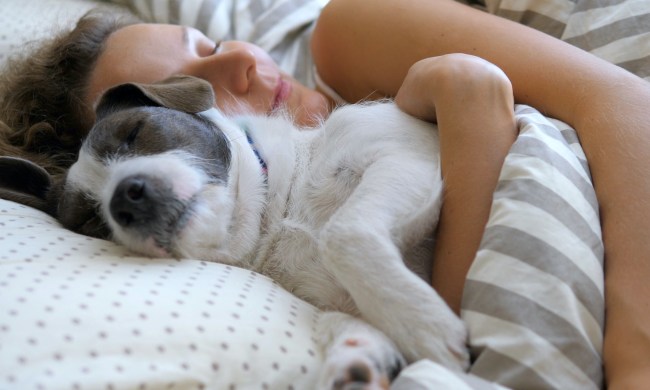When it comes to popularity, boxers have it in spades. These intelligent canines have it all — playfulness, loyalty, energy, and tons of affection to give — so much so that the American Kennel Club listed them as the 14th-most-popular breed in America in 2020.
Originating in Germany, the boxer breed was originally used as a messenger and guard dog for the military. They became popular in America in the 1940s when returning World War II soldiers brought their guard dogs home with them. Today, boxers are a favorite among families for their friendliness with children as well as with other dogs.
But unlike other dogs of similar size, such as Rottweilers and Australian shepherds, boxers aren’t well suited to spending much time outside. If you own a boxer, the healthiest place for him to live is in the house with his human family. Here are five reasons why.
Your boxer craves attention
One of the boxer’s most endearing character traits is his need for affection. And as a family dog, he really wants to be with his humans as much as possible. Keeping him outside and away from those he loves best can change his playful, friendly temperament for the worse.
Boxers who are left alone outside for long periods may exhibit:
- Aggressive behavior, including territorial tendencies
- Destructive behaviors, such as chewing and digging
- Disobedience, such as jumping up and not heeding commands
- Unhappiness, including stress and anxiety
Your boxer is a brachycephalic breed
The boxer’s most recent ancestor is the bullenbeisser, a dog bred to hunt wild boar, bear, and deer. As a direct descendant, your boxer has a flat face that’s perfect for holding on to prey while breathing at the same time. Unfortunately, that design isn’t effective for cooling efficiently during the summer, so he has to work much harder than most dogs to cool off when the temperature is high.
Unlike people, dogs don’t have sweat glands. They cool themselves by panting, which exchanges the warm air in their lungs with cooler air from outside. Because brachycephalic breeds like boxers are prone to overheating and more likely to have breathing problems, they are much more comfortable inside when the temperatures rise.
Your boxer has short hair
While your boxer’s coat is easy to groom, his short hair isn’t much protection during the cold winter months. Because he doesn’t have an undercoat (which acts as insulation) like many breeds such as Australian shepherds and Akitas, his thin fur also makes him susceptible to sunburn throughout the year during the hours of most intense sunshine.

Your boxer needs mental stimulation
Theories about the origin of the boxer’s name vary; however, one popular theory believes it’s due to the way he playfully stands on his hind legs and “boxes” with his front paws. The breed is also known for their jumping and climbing skills, so a bored boxer may be more likely to seek adventure outside the confines of his own yard.
Living outside puts your boxer at risk
Your boxer is a loyal guard dog. Chances are good he can fend off most predators; however, some of the smallest threats can be the most dangerous. Parasites like fleas, ticks, and mosquitoes carry diseases such as tapeworms, Lyme disease, and Rocky Mountain spotted fever. These nasty bugs live outside in the tall grass and bushes, waiting for a host mammal to walk by.
Living outdoors also puts your boxer at risk of becoming dehydrated and developing heatstroke during the hot summer months. Again, a boxer’s short nose and wide head put him more at risk for these conditions than his longer-nosed canine counterparts.
Your boxer belongs indoors, with the family
We get it. Your boxer drools and snores. And if he hasn’t been trained, he also may lack some of the manners he needs to make him a good house pet. Invest in some good obedience training. Find a place for his crate to live so his nighttime chortles won’t keep the entire family awake. Give him plenty of exercise — at least two 30-minute walks a day if possible. And above all else, reward his cuddly nature with lots of love and affection.
Remember, your boxer isn’t just a popular breed of dog; he’s also a member of the family. And more than most breeds, he tends to act like one. With the proper love and guidance, he’ll be a fiercely loyal guard dog as well as a goofy and friendly playmate indoors and out.



